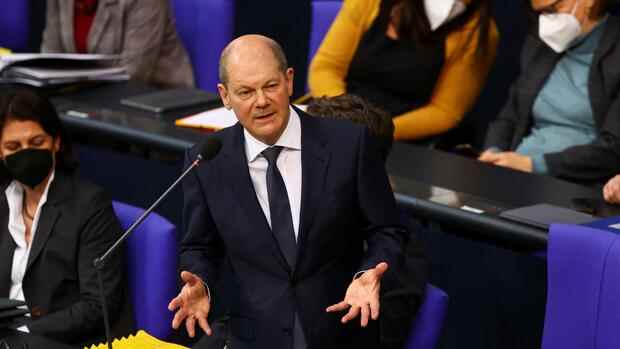Berlin Olaf Scholz (SPD) speaks a little more carefully than usual, and there is sadness in his voice. “The murder of civilians is a war crime,” says the Chancellor, referring to the massacre of Ukrainian civilians in Bucha.
The perpetrators and clients would have to be held accountable, and the atrocities ruthlessly cleared up. Scholz has no illusions. “We have to reckon with the fact that we will see more pictures like the one from Bucha.”
Since the beginning of the last electoral term, it has been customary for the government, and thus also the Federal Chancellor, to answer questions from MPs in the Bundestag. That should lighten up the debate.
But never did an interrogation take place under such circumstances as these: in wartime, a few days after a terrible massacre; at a time when Germany is supplying arms to a war-torn region; at a time when Germany’s own energy supply is threatened by dependence on Russian supplies – and when Germany is coming under increasing international pressure to also impose an import ban on Russian oil and gas.
Top jobs of the day
Find the best jobs now and
be notified by email.
It is said that in times of crisis the hour of the executive comes. This is even more true in times of war. Many decisions are currently being made in secret, and the Bundestag is largely left out. Those MPs who had hoped that the Scholz questioning would shed more light were disappointed.
The applause for Scholz comes only hesitantly
This applied in particular to the debate on arms deliveries. “Unlike previous governments, the federal government decided to deliver weapons to a crisis area, and we are doing that,” said Scholz at the beginning, waiting for applause. First there was an isolated, then hesitant clapping.
“It must remain our goal that Russia does not win this war,” Scholz said. In coordination with the EU and NATO partners, Ukraine will continue to be supplied with weapons and the pressure on Russia will be increased through sanctions.
After that, the opposition in particular tried to get more information out of Scholz. What he says about the criticism from Ukraine that Germany is not supplying enough weapons. Why the Chancellery isn’t responding to Kiev’s demands to send 100 Marder infantry fighting vehicles to Ukraine. Why the Czech Republic delivers tanks to Kyiv, but not Berlin.
The Chancellor remains vague
But no matter how often Union politicians probed, the Chancellor’s answers always remained vague: the arms deliveries were in themselves “a break with long traditions”. Every step must be “closely coordinated with NATO”, a “German special path would be a serious mistake”. And, of course, “everything that makes sense will be set in motion”. Just as Secretary of Defense Christine Lambrecht “does everything that is necessary”.
Scholz defended the defense minister against criticism that she was overwhelmed by the crisis. “Whatever weapons we can deliver from the Bundeswehr’s current stocks, everything that makes sense and works quickly, that will be delivered.”
Scholz made the Union upset. Union MP Matthias Hauser tweeted: “The Chancellor clearly enjoys answering the opposition’s questions during the government survey – especially on the serious subject of war – to answer without content. Unworthy of a chancellor.”
Federal government sticks to the no to the oil and gas embargo
With the second major issue, an energy embargo also for Russian oil and gas, the deputies are likely to have become only a little smarter after the survey.
Scholz said the fifth package of sanctions was in the final debate. “It will once again make a precise contribution to Russia feeling the consequences of this war, also to ensure that it ends the war.” The Chancellor did not comment on the details of the planned sanctions.
The EU Commission had proposed an embargo on coal from Russia. The federal government will support this, but not an embargo on oil and gas for the time being. Scholz made this clear in the survey by emphasizing Germany’s existing dependence on importing Russian energy. “We all know that these dependencies have grown over decades and they cannot be ended from one day to the next.” That is why a common European course is important here.
In order to reduce dependency, it is crucial to expand LNG terminals to import liquefied natural gas (LNG) and to “reorganize import structures”. The expansion of the domestic grid is also important in order to promote the expansion of renewable energies. “We will make ourselves independent of the dependence on fossil raw materials,” says Scholz. “Especially now.”
“It must not end in a dictated peace”
From Scholz’s point of view, the neutrality offered by Ukraine in the event of an end to the Russian war of aggression is a “major concession to the aggressor”. At the same time, Scholz made it clear: “It must not amount to a dictated peace.”
When he speaks to Russian President Vladimir Putin, he always makes it clear: “It is the Ukrainians who negotiate what they are willing to agree on. Nobody else.”
The question of security guarantees for Ukraine has “not yet been spelled out,” said the SPD politician. “Of course we talk about it, with Ukraine, also with the others who have been addressed. But also with the necessary confidentiality.”
More: Dispute over Russia policy: Friedrich Merz accuses SPD of “deep entanglements”.
